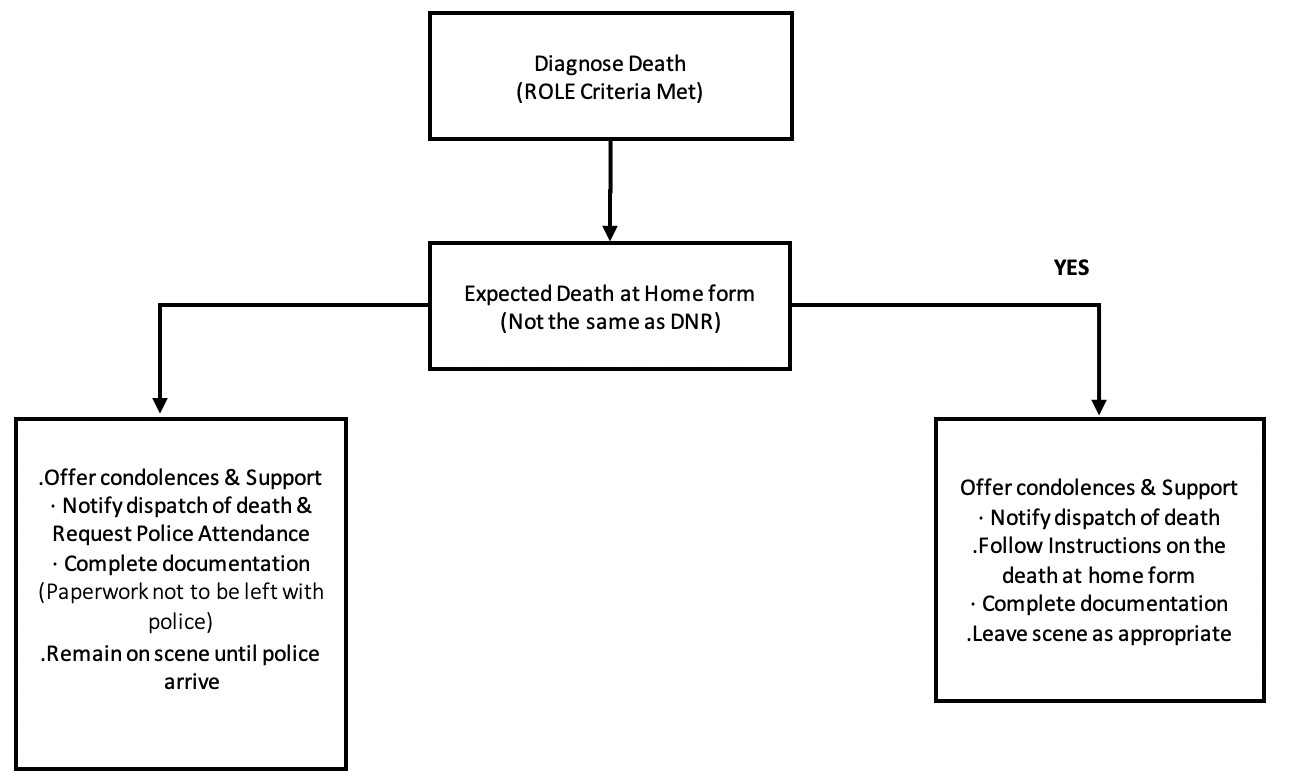Confirmation
R03: Recognition of Life Extinct
Updated:
Reviewed:
Introduction
This guideline has been designed to provide information to paramedics on the holistic aspects of cardiac arrest management: specifically, how to recognize life extinct, or confirm death. It is to be used in conjunction with CPG R02: Discontinuing Resuscitation.
Essentials:
Consultation with CliniCall must be made to confirm the discontinuation of resuscitation in all cases where CPR was begun. The ROLE assessment occurs after the CliniCall consult and termination of resuscitation.
General
Unless the criteria for obvious death are met, all of the following elements must be satisfied and confirmed independently by at least two paramedics following the discontinuation of resuscitation, and before a determination is made that life is extinct:
- No palpable carotid pulse for 90 seconds.
- No heart sounds heard for 90 seconds.
- No breath sounds heard or respiratory effort observed for 90 seconds.
- Fixed (non-responsive to light) and dilated pupils. These may vary due to an underlying eye illness.
- No response to central stimulus. (Previous chest compressions is enough to demonstrate a lack of response.)
- ACP and CCP only: when able, observe asystole or pulseless electrical activity with a rate of 30 beats per minute or less for over 60 seconds.
In cases of environmentally caused hypothermia, the lack of signs of life is unreliable, and cannot be used for recording life extinct. These patients should be transported as soon as possible to a facility where aggressive rewarming during resuscitation is possible, preferably using extra-corporeal membrane oxygenation where possible. Contact CliniCall to discuss options.
In the event paramedics are unsure, or are concerned that the ROLE criteria have not been met, CliniCall must be consulted for further guidance.
Actions To Be Taken After Death Has Been Established

References
- Grunau B, et al. Comparing the prognosis of those with initial shockable and non-shockable rhythms with increasing durations of CPR: Informing minimum durations of resuscitation. 2016. [Link]
- Grunau B, et al. Gains of continuing resuscitation in refractory out-of-hospital cardiac arrest: A model-based analysis to identify deaths due to intra-arrest prognostication. 2017. [Link]
- Grunau B, et al. External validation of the universal termination of resuscitation rule for out-of-hospital cardiac arrest in British Columbia. 2017. [Link]
- Morrison LJ, et al. Validation of a rule for termination of resuscitation in out-of-hospital cardiac arrest. 2006. [Link]
- Reynolds JC, et al. Association between duration of resuscitation and favorable outcome after out-of-hospital cardiac arrest: implications for prolonging or terminating resuscitation. 2016. [Link]